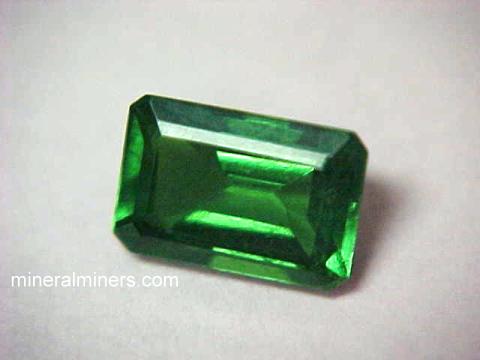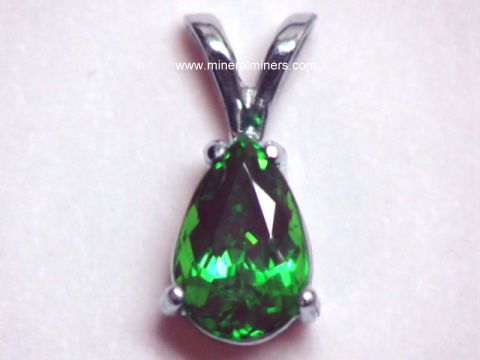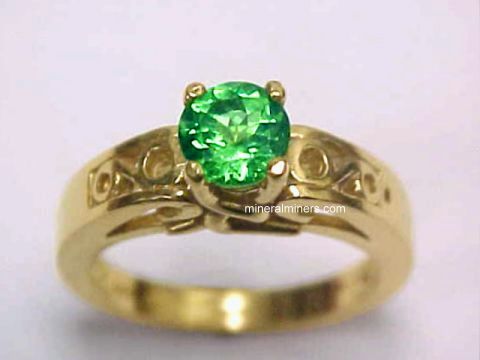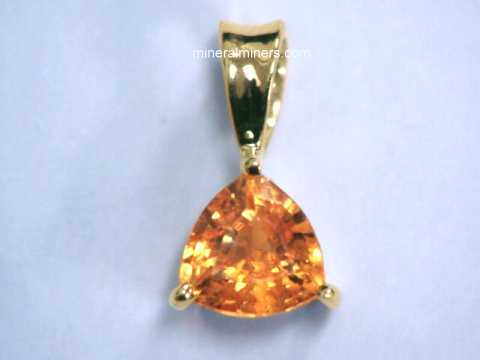


Garnet Information Garnet is an isometric mineral with many sub-species all displaying the same crystal structure. The main Garnet Varieties are based on ideal end-member chemical compositions; Almandine Garnet, Pyrope Garnet, Spessartite Garnet, Andradite Garnet, Grossular Garnet, and Uvarovite Garnet.
There are some natural garnet varieties of intermediate composition like the malaia garnets, the
Mozambique garnet, and the rhodolite garnets. These natural garnets have chemical compositions that are a mix of two or more of the ideal end member garnet varieties.
There also are some sub-specie garnet varieties
based on specific colors like the tsavorite green garnet, the yellow-orange to red hessonite garnet, the brilliant green demantoid garnet, and the beautiful mandarin orange garnet. Another very rare gem garnet variety is the natural color change garnet.
MINERALMINERS.COM®- Your Personal 'Link' Direct to the Garnet Mines!TM
Garnet Information
Garnets
Links To Garnet Information Topics:
Garnet Varieties in Our Store
Return to the Index of
Return to the Index of Garnet Information Topics


The garnets are a group of mineral species all having essentially the same isometric crystal structure but varying in chemical composition and in many of their physical properties.
There are six species of common garnets based on ideal end-member chemical compositions. These six species are divided into two groups; the pyralspite group which are the pure chemical end-members Fe3Al2(SiO4)3 (almandine), Mg3Al2(SiO4)3 (pyrope) and Mn3Al2(SiO4)3 (spessartine), and the ugrandite group or calcium garnet group consisting of Ca3Fe2(SiO4)3 (andradite), Ca3Al2(SiO4)3 (grossular), and Ca3Cr2(SiO4)3 (uvarovite, which actually is not 'common' at all!). Extensive solid solution occurs within these two groups, but normally very little substitution occurs between them.
Garnets very rarely if ever occur in nature with compositions precisely matching the pure end-member common garnet species (almandine, pyrope, spessartine, andradite, grossular and uvarovite). A natural garnet's composition typically falls somewhere between these end-members, somewhere within the solid solution ranges for the pyralspite group or the ugrandite group. Varietal names have been given to some garnets of intermediate composition in these solid solution series such as the rose-red to purple rhodolite garnet, which has a chemical composition averaging a 2:1 mixture of pyrope to almandine. An additional intermediate variety between pyrope and almandine with a chemical composition averaging a 1:1 mixture of pyrope to almandine is the Mozambique Red Garnet with its beautiful dark red color. Another intermediate composition example is the yellow to orange to red garnet variety malaia which is of an intermediate composition range between spessartine and pyrope. This garnet variety also has a significant grossular component, which is quite unusual and unexpected due to the significant size difference between the substituting ions.
The ions Cr3+, V3+ and Ti3+/4+ can substitute in some of the common garnet compositions or occur as trace impurities, resulting in numerous less common garnet varieties. Some of these less common garnet varieties are of specific colors such as the green vanadium grossular garnet variety tsavorite garnet and the green chromium andradite garnet variety demantoid garnet.
When significant amounts of vanadium and chromium impurities occur in malaia garnets, a distinct color change is visible when viewed under fluorescent light versus incandescent light. Garnets exhibiting this rare color behavior are known as color change garnets.
Grossular garnets of yellow-orange to orange-red to brown colors are known as hessonite garnets. Some grossular garnet occurs in a translucent massive form known as hydrogrossular with (OH)4-4 substituting for (SiO4)-4 tetrahedra in its crystal structure.
Garnet is allochromatic, meaning that most of the color variations in different garnets are due to their highly variable trace element impurities rather than to their bulk composition elements. The color we see in garnets is produced when light is selectively absorbed by these ions or by interactions between these ions (intervalent charge transfers).
It is not possible to determine
the precise species or variety of a garnet based solely upon a comparison of its refractive index and
specific gravity (let alone determining a variety solely by its color!),
although comparing the refractive index and specific gravity can narrow down the possibilities
considerably.
In most cases, unit cell dimension measurements can be compared with the refractive
index and specific gravity to determine chemical composition in terms of major end-members.
In the absence of chemical analysis some
ambiguitiy will often still exist, leaving one to rely on additional information such as
occurance, associated minerals and color.
However, methods that rely on specific gravity measurement can be misleading, because the specific gravity is not only difficult to measure accurately, but also is prone to error in garnets due to their abundant inclusions which can alter their specific gravity considerably.
Perhaps the most reliable method outside of chemical analysis for determining garnet species and varieties in gem garnets is by comparing their absorption spectrum, refractive index and color, which gives a conclusive identification.
Some almandine garnets form with asbestiform mineral inclusions, typically of pyroxene or amphibole, that give a chatoyant effect yielding a four-ray star when fashioned into a cabochon gem.
Return to the Index of Garnet Information Topics


Garnets form in a variety of geologic settings, depending on the garnet species.
Almandine typically occurs in schists and gneisses, resulting from regional metamorphism of argillaceous sediments. It is a characteristic mineral constituent of the amphibolite metamorphic facies, also appearing in the granulite facies. Almandine also occurs in pegmatite dikes and in some granitic and volcanic rocks, as well as in sedimentary deposits as detrital grains.
Pyrope is characteristic of ultra-mafic rocks such as peridotites, kimberlites, eclogites, and serpentines, and in sedimentary deposits derived from their weathering.
Spessartine occurs occasionally in granitic pegmatites and in skarns, also found in sedimentary deposits.
Andradite commonly occurs in contact metamorphic deposits, resulting from metamorphism of impure limestones. It also is found in some metasomatic skarn deposits. The light colored andradite varieties topazolite and demantoid occur mainly in serpentinites and chlorite schists. The darker andradite varieties melanite and schorlomite occur mainly in alkaline igneous rocks such as nepheline syenites and phonolites.
Grossular occurs mainly in contact and regional metamorphic deposits, resulting from metamorphism of impure limestones. It also has been found in alkaline igneous rocks, and has been reported in pegmatites and hydrothermal veins.
Uvarovite is a rare garnet occurring in peridotite and serpentinite associated with chromite.
Garnets are usually recognized by their form, color and hardness. The garnet varieties can be distinguished by their refractive index, absorption spectrum and color. Another method utilizes specific gravity, refractive index and unit cell dimension.
The name garnet is from the Latin word granatus which originated
when garnet grains in rock were compared to the dark red seeds of the
pomegranate fruit.
Pyralspite is derived from the names of the three garnet species in
its group: PYRope, ALmandine, and SPessartine, with 'ite' added to the end.
Ugrandite is derived from the names of the three garnet species in
its group: Uvarovite, GRossular, and ANDradite, with 'ite' added to the end.
Almandine was named after the ancient locality Alabander in Asia minor, where
once many garnets were cut and polished.
Pyrope is from the Greek for fire-like, refering to its color.
Spessartite was named for a locality in the Spessart district in Bavaria.
Andradite was named after the Portuguese mineralogist d'Andrade.
Grossular was named after the gooseberry R. grossularia,
because of the similar pale green color of the original specimens.
Uvarovite is named after the Russian mineralogist Count Sergei Simonovitch Uvarov.
Rhodolite is from the Greek rhodon meaning rose, refering to its color.
Malaia is from the Swahili word malia meaning
out of the family, refering to the fact that this garnet variety
typically has some distinctively different physical properties than other
garnets found in the same area.
Tsavorite is named after the Tsavor Game Preserve of Kenya, near which it was discovered.
Demantoid is from the French demant meaning diamond,
in allusion to its similar brilliance.
Melanite is from the Greek melanos meaning black,
refering to its color.
Topazolite named after its similarity to yellow topaz.
Garnets have been used as gemstones for many thousands of years. In ancient
times they were known as carbuncles, as were other red gems.
Carbuncles were in the 'Breastplate of Judgement' of
Aaron, described in the bible (Exodus: xxviii, 15-30). The Koran states that the fourth heaven is
composed of carbuncle. In Vedic astrology ( 1000's of years older than western
astrology and still practiced by millions today), the brownish-orange/red hessonite garnet
has long been a preferred talisman for warding off the evil influences of the celestial body named Rahu. Garnet was
considered a sacred stone by many native indian tribes
of North, South and Central America.
In 1892, the Hunzas used bullets made of garnet against the British troops
in Kashmir, believing them to be more deadly than lead.
Historically, garnets were believed to give protection from wounds and
poison, to stop bleeding and to symbolize truth & fidelity, and bring prosperity.
As gemstones, garnets today are more popular than ever. Some of the
newer varieties have only become available in recent years.
Garnets are also used today for a number of abrasive purposes.
Garnet is the birthstone for the month of January.
Garnet is the symbolic gemstone for the 18th wedding anniversity.
The astrological signs of garnet are Leo, Virgo, Capricorn and Aquarius.
Garnets are said to enhance creativity and understanding, and
to bring success in business. They also are said to strengthen willpower and
increase self-esteem and popularity.
Garnets are also said to help in the treatment of infectious diseases,
blood poisoning, and heart & lung diseases.
The following properties are attributed to some of the specific garnet varieties:
Almandine is said to be particularly usefull for strengthening the heart,
to inspire love and to perceive truth.
Andradite is said to give vitality and to help prevent
fears, insecurity, and feelings of loneliness.
Pyrope is said to enhance understanding and wisdom.
Rhodolite is said to facilitate meditation and enhance intuition, and to inspire love.
Tsavorite is said to facilitate meditation, and to enhance spiritual awareness and
telepathic abilities.
For additional metaphysical properties of garnets, see our Metaphysical Books section.
Go up to the Top of this Garnet Information page